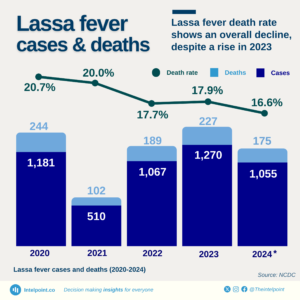NCDC Reports A Surge in Lassa Fever Cases
The Nigeria Centre for Disease Control and Prevention (NCDC) has increased its attention to the ongoing Lassa fever outbreak as cases and fatalities continue to rise speedily across the country.
At a press conference on December 23, 2024, in Abuja, Dr. Jide Idris, Director General of the NCDC, disclosed alarming figures:
- 9,492 suspected cases
- 1,154 confirmed cases
- 190 deaths
Dr. Idris highlighted a sharp rise in cases over the past four weeks, particularly in six high-burden states: Ondo, Edo, Bauchi, Taraba, Benue, and Ebonyi. He noted, “The case fatality rate remains alarmingly high at over 13%, and we have observed a rise in suspected cases compared to the same period in 2023, possibly due to enhanced surveillance.”
According to Dr. Idris, the NCDC has put forth lots of ways to reduce the outbreak and its effects in the communities and states. he explained them
Activation of the Emergency Operations Centre (EOC): Ensuring seamless coordination of control and management efforts using a One Health approach.
Distribution of Medical Supplies: Provision of critical infection prevention and control materials, laboratory tools, and diagnostic kits to affected states.
Expansion of Testing Facilities: Increasing Lassa fever testing laboratories from nine to 13, with plans for further upgrades.

Risk Assessment and Surveillance: Conducting dynamic risk assessments to tailor interventions to the most affected areas.
Community Engagement: Broadcasting prevention messages on local media and conducting rodent control exercises in hotspot states like Edo, Ondo, and Ebonyi.
Dr. Idris further mentioned the importance of early diagnosis and treatment, noting, he stated, “Early presentation greatly increases survival rates. We urge individuals experiencing symptoms such as fever, headache, muscle pain, and vomiting to visit health facilities immediately.”
Lassa fever, an acute viral hemorrhagic illness, is transmitted through contact with infected rodents or contaminated materials. Person-to-person transmission can also occur through contact with body fluids of infected individuals.
In reducing the risk of infection, the NCDC has advised the public to:
Maintain clean environments and block entry points for rodents; Store food in sealed containers and avoid open drying of foodstuff. Eliminate rodents using traps and safe methods; and Practice proper hand hygiene and avoid self-medication.
Healthcare workers have been advised to adhere strictly to infection prevention protocols and promptly report suspected cases to local authorities.
The NCDC is also working closely with the state government and other important parastatals to lessen the Lassa fever effect. Dr. Idris added, “This is a critical moment for all stakeholders to come together to combat this public health threat. By implementing preventive measures and strengthening surveillance, we can reduce cases and save lives.”
NCDC is also working tirelessly to ensure that the health of the populace is protected, especially during this festive period, through proactive measures and combined efforts. Nigerians are advised to call 232, the NCDC hotline, for immediate assistance whenever they feel the symptoms.
READ: Police Reject Allegations Of “Extrajudicial Killings”
Content Credit| Igbakuma Rita Doom
Picture Credit | https://idac.dubawa.org/




